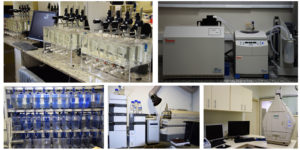Our PPG supervisors rely on the infrastructure of the Faculty of Pharmaceutical Sciences of Ribeirão Preto (FCFRP/USP) which provides adequate conditions for the development of their research lines, with a significant impact on the quality of the graduate student body.
LIBRARY
BCRP/USP has a physical area of 4,243 m2. Its collection comprises 121,992 books, 3,392 titles from national and foreign journals, 20,709 theses and dissertations, and 82,545 scientific works published by the faculty and researchers of the Campus. It also offers online access to 500 databases and more than 131,000 scientific journals and 434 thousand electronic books (e-books). From this collection, FCFRP/USP has 8,606 books, 1,468 theses, and dissertations, and 8,322 scientific works. The collection is consulted through the Dedalus bibliographic database (www.dedalus.usp.br), the Integrated Search Portal (www.buscaintegrada.usp.br/) or through the USP Libraries application and has a loan system between libraries (EEB) for books and bibliographic switching (Comut) to obtain copies of scientific articles.
VIVARIUM
For research activities involving experimentation on animals, PPG professors, and graduate students rely on the General Animal Facility of the USP Campus in Ribeirão Preto, which is part of the Coordination of the USP Animal Facility Network, which maintains the technical responsibility of two veterinarians. The FCFRP/USP has three vivarium units, called Vivarium I (breeding and maintenance), Vivarium II (breeding and maintenance of animals SPF – Specific Pathogen Free), and Vivarium for Environmental Toxicology, for the breeding and maintenance of fish of the Danio rerio species.
COMPUTING
Currently, FCFRP/USP has 868 microcomputers and 109 notebooks in use. Of these microcomputers, 82 are intended for the Faculty’s administrative sections and departmental secretariats. The others are for use by professors, graduate students, and classrooms. All professors and students of the FCFRP/USP PPGs have access to the Internet in their research laboratories. It also has 2354 network points installed in structured cabling starting from 26 racks distributed in its 19 buildings, which are used to connect both the units and private equipment. In addition to providing teachers and students with 10 servers, with DNS services, Websites, security cameras, software repository, backup, wireless control system, access door control system, online system for technical calls, etc.
RESEARCH LABORATORIES
The infrastructure for teaching, research, and extension covers all the needs for the activities proposed in the different lines of PPG in Toxicology. Currently, some research laboratories linked to PPG are considered unique in terms of excellence in Brazil and Latin America, mainly due to the complexity and modernity of the equipment installed. It has 8 Facilities, which allow access to Multiuser Equipment, available to PPG professors and students, allowing access to highly complex and costly equipment, advanced investigation techniques and methods, in addition to access to specialists and services aimed at cutting-edge scientific research. In addition, they have access to DNA sequencers and electron and confocal microscopy through collaborations established with FMRP/USP, Blood Center at FMRP/USP, and FFCLRP/USP.
1. Organic Micromolecule Mass Spectrometry Center Facility (CEMMO;
2. High-Resolution Imaging and Cell Studies Central Facility (LIAREC);
3. Laboratory of Toxinology – Protein Sequencing;
4. Center of Excellence for Lipid Quantification and Identification (CEQIL);
5. Industrial Pharmacotechnique Laboratory (LAFAI);
6. Multi-User Nucleic Acid Sequencing Laboratory (LMSeq);
7. Laboratory of P&D in Pharmaceutical Processes (LAPROFAR);
8. FCFRP Analytical and Systems Toxicology Laboratory (ASTox).
1. Organic Micromolecule Mass Spectrometry Center Facility (CEMMO;
2. High-Resolution Imaging and Cell Studies Central Facility (LIAREC);
3. Laboratory of Toxinology – Protein Sequencing;
4. Center of Excellence for Lipid Quantification and Identification (CEQIL);
5. Industrial Pharmacotechnique Laboratory (LAFAI);
6. Multi-User Nucleic Acid Sequencing Laboratory (LMSeq);
7. Laboratory of P&D in Pharmaceutical Processes (LAPROFAR);
8. FCFRP Analytical and Systems Toxicology Laboratory (ASTox).
- Education
- Undergraduate
- Graduate
- Graduate Commission
- Graduate Service
- Biosciences and Biotechnology Program
- Pharmaceutical Sciences Program
- Toxicology Program
- History and Objectives
- Faculty and Research Lines
- Student Body and Research Projects
- Selection Process and Enrollment
- Theses and Dissertations
- Post-Doc (PNPD)
- Publications Print USP/CAPES
- Special Notice: Mozambique Agreement
- Subjects
- Program Regulations
- Forms
- Grant of Scholarships
- Awards
- Infrastructure
- Defenses
- Diplomas
- Teaching Improvement Program (PAE)
- History of Graduate Studies
- Regulations and Rules
- International Collaborators

